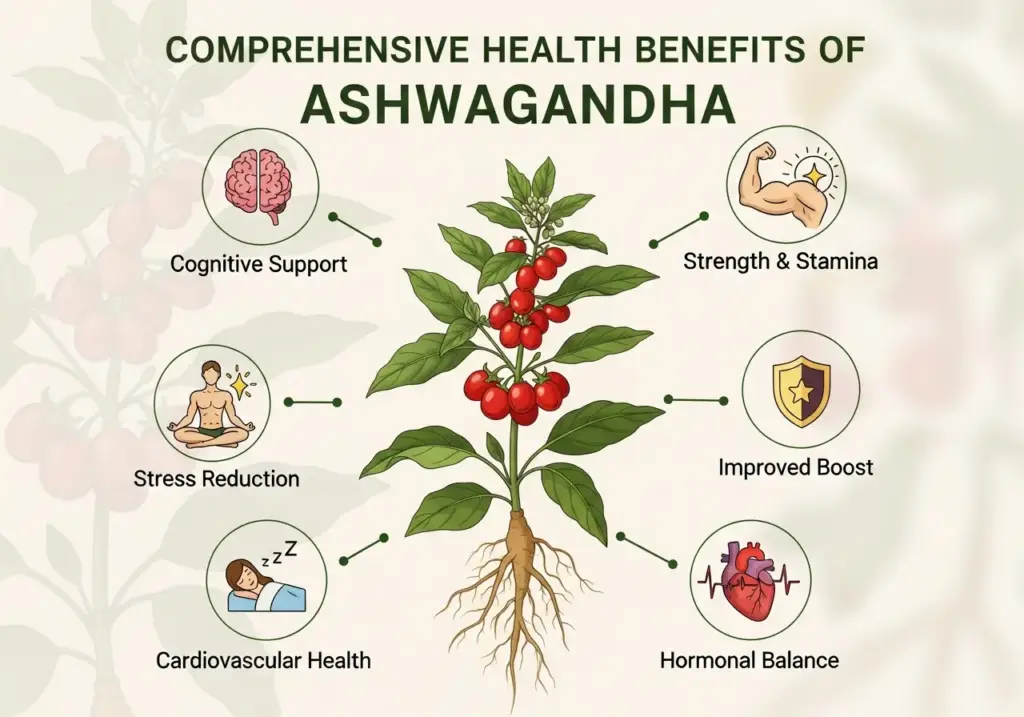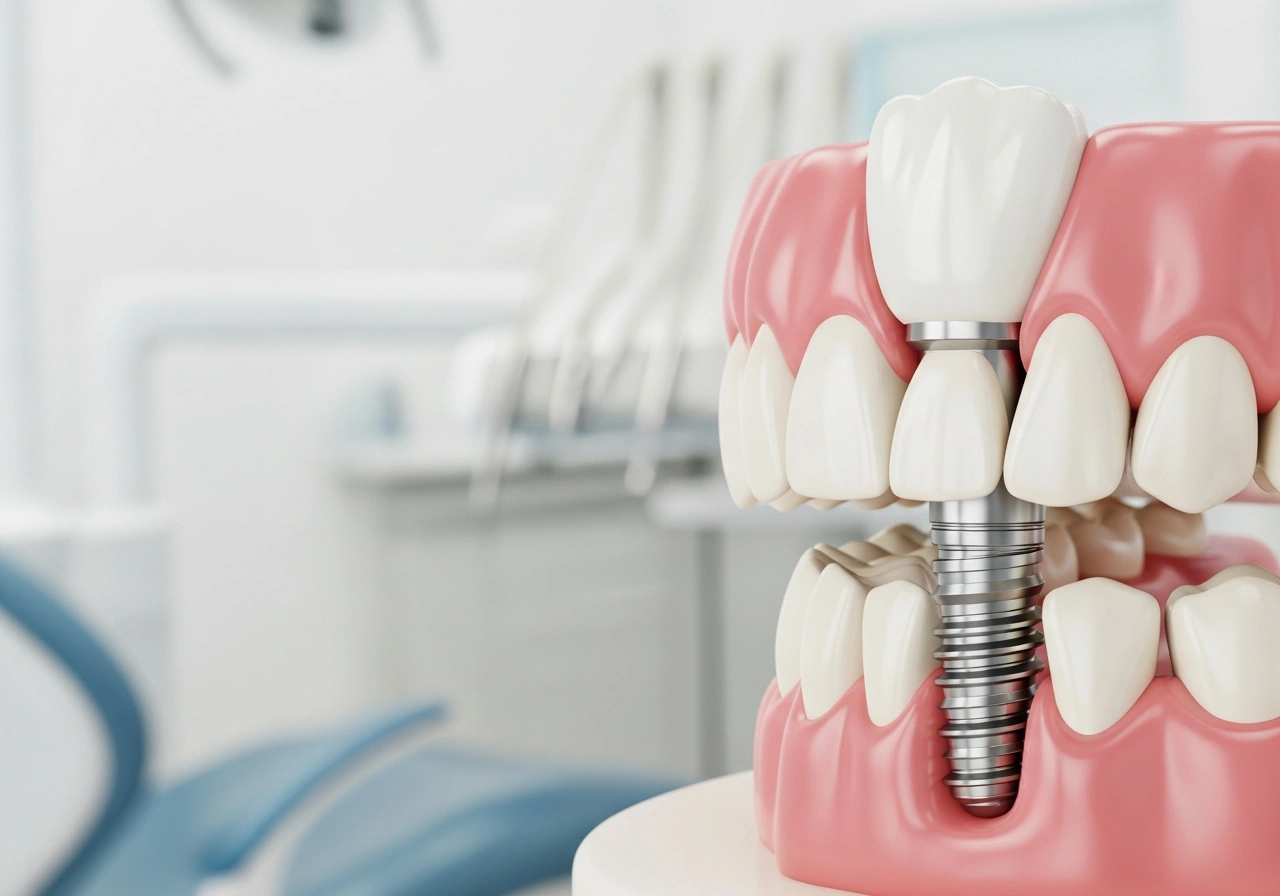Introduction to the Adaptogenic Power of Ashwagandha
Ashwagandha (Withania somnifera), also known as Indian ginseng or Winter Cherry, is one of the most revered herbs in the traditional Indian system of medicine, Ayurveda. Classified as a Rasayana (rejuvenating tonic), its most prominent classification in modern science is as an adaptogen. An adaptogen is a natural substance that helps the body resist the damaging effects of stress and restore normal physiological functioning. Modern clinical research is increasingly validating the centuries-old traditional uses of the Ashwagandha root, particularly focusing on its active compounds, known as withanolides.
Stress Management and Cortisol Reduction
The most evidence-backed benefit of Ashwagandha lies in its powerful ability to modulate the body’s response to stress. Chronic stress elevates the hormone cortisol, which can lead to negative health outcomes like weight gain, compromised immunity, and chronic anxiety.
The Hypothalamic-Pituitary-Adrenal (HPA) Axis
Research indicates that Ashwagandha works by directly modulating the HPA axis, often referred to as the body’s central stress response system. Several randomized, controlled trials in chronically stressed adults have shown that Ashwagandha root extract significantly reduces levels of the stress hormone cortisol, sometimes by as much as 23% to 33%. This regulatory effect promotes a greater sense of tranquility and resilience without causing sedation.

Athletic Performance, Muscle Strength, and Recovery
Ashwagandha is increasingly recognized in sports nutrition as a natural ergogenic aid—a substance that enhances athletic performance.
Enhanced Strength and Muscle Mass
Studies focused on healthy young men engaging in resistance training have demonstrated that Ashwagandha supplementation can lead to significant increases in muscle strength and size (hypertrophy) compared to placebo groups. This effect is thought to be partly due to its ability to reduce cortisol (a catabolic, muscle-breaking hormone) and potentially increase anabolic hormone levels.
Improved Cardiorespiratory Endurance (VO2 Max)
Ashwagandha has been shown to improve VO2 max, which is the maximum amount of oxygen the body can utilize during intense exercise. Improved VO2 max indicates enhanced cardiovascular fitness and endurance. This benefit has been observed in both physically active adults and elite athletes, helping them sustain physical effort for longer periods.
Mental Health and Anxiety Reduction
Beyond its general stress-relieving properties, clinical studies support Ashwagandha’s role in managing specific mental health symptoms.
Anxiolytic Effects
Ashwagandha is believed to possess anxiolytic (anxiety-reducing) properties. Several double-blind, placebo-controlled trials have found that standardized extracts can lead to significant reductions in scores on stress and anxiety rating scales in participants with moderate to severe anxiety. This effect is attributed to its impact on GABA signaling, which helps calm nervous system activity.
The Science of Good Gut Health: Understanding Probiotics
Depression and Mood
While not a primary treatment for clinical depression, some studies suggest that Ashwagandha may have antidepressant-like effects, potentially by influencing key neurotransmitters like serotonin and dopamine, and by reducing overall systemic inflammation which is increasingly linked to mood disorders.
Testosterone and Male Fertility
In men, Ashwagandha has demonstrated notable effects on reproductive health, primarily by addressing underlying hormonal imbalances and oxidative stress.
Increased Testosterone and Sperm Quality
In clinical trials involving infertile men, supplementation has been associated with significant increases in serum testosterone and luteinizing hormone (LH) levels. Furthermore, it has been shown to enhance various parameters of male fertility, including increased sperm concentration, semen volume, and improved sperm motility. While the effects are most pronounced in men with fertility issues, it contributes to hormonal balance in physically active men as well.
Blood Sugar Regulation
Preliminary clinical and laboratory research highlights Ashwagandha’s potential as an anti-diabetic agent.
Insulin Sensitivity and Glucose Uptake
Studies suggest that the herb can improve insulin sensitivity and promote the uptake of glucose by skeletal muscle and fat cells. In patients with metabolic syndrome, Ashwagandha supplementation has been shown to improve levels of fasting blood glucose and serum triglycerides, suggesting utility as an adjuvant therapy in managing blood sugar.
Inflammation and Antioxidant Activity
The root’s therapeutic profile is largely driven by its potent anti-inflammatory and antioxidant properties.
Withanolides and Anti-Inflammatory Action
The steroidal lactones, particularly withaferin A, found in Ashwagandha, exhibit powerful anti-inflammatory effects by inhibiting the production of certain pain mediators and inflammatory signaling pathways. This anti-inflammatory action may contribute to its traditional use in managing conditions like arthritis and general pain.
Neuroprotective Antioxidant Effects
Ashwagandha is a rich source of antioxidants that scavenge free radicals. This action helps protect cells, including brain cells, from oxidative damage. This neuroprotective quality is a mechanism behind its potential benefits for thinking and memory.
Thinking, Memory, and Cognitive Function
Ashwagandha is traditionally revered for its medhya (intellect-promoting) properties, a benefit supported by modern neurocognitive research.
Improved Cognitive Performance
Several studies indicate that supplementation can improve various cognitive functions. Benefits observed include enhanced immediate and general memory, improved attention and concentration, faster reaction time, and better information-processing speed. This cognitive boost is partly due to its ability to increase brain-derived neurotrophic factor (BDNF), which promotes the survival and differentiation of nerve cells.
Sleep Quality and Insomnia
The botanical name, Withania somnifera, translates roughly to “sleep-inducing,” reflecting its traditional use as a mild sedative.
Promoting Restful Sleep
Research confirms that Ashwagandha can improve overall sleep quality and may be particularly helpful for individuals suffering from insomnia. This effect is often an indirect benefit of its anxiety-reducing and stress-modulating actions, allowing the body to relax and transition into more restful sleep cycles.
Safety and Side Effects
Ashwagandha is generally considered safe for short-term consumption by most healthy individuals.
Common Side Effects
When side effects do occur, they are typically mild and limited to the digestive system, including gas, bloating, stomach upset, or diarrhea, especially when taken in large doses or on an empty stomach.
Special Precautions and Contraindications
Due to its hormonal and metabolic activity, certain groups should exercise caution or avoid Ashwagandha entirely:
- Pregnancy and Breastfeeding: Ashwagandha is considered likely unsafe during pregnancy due to potential risks of increasing uterine contractions. It should be avoided while breastfeeding as safety data is lacking.
- Autoimmune Diseases: As Ashwagandha may stimulate the immune system, people with autoimmune conditions such as Lupus, Rheumatoid Arthritis, or Multiple Sclerosis should consult a physician before use, as it could potentially worsen symptoms.
- Thyroid Conditions: Ashwagandha can increase thyroid hormone levels. Individuals with hyperthyroidism or those taking thyroid hormone medication should use it cautiously and monitor their thyroid levels closely with a doctor.
Dosage Recommendations
There is no universally standardized dosage, as effective doses vary widely based on the extract type, the concentration of withanolides, and the condition being treated.
Research-Backed Dosing Ranges
- Standard Root Powder: Traditional Ayurvedic recommendations often involve higher doses of crude powder, typically 3 to 6 grams per day.
- Standardized Extract (Most Common in Studies): The most common and effective dosage range in clinical trials is 300 mg to 600 mg of a high-concentration extract taken once or twice daily. Extracts should be standardized to contain at least 2.5% to 5% total withanolides.
- Stress and Cortisol Reduction: Doses around 250 mg to 600 mg per day have shown significant efficacy.
- Athletic Performance/Strength: Doses ranging from 500 mg to 1,250 mg per day have been used in performance-focused studies.
- Timing: Many experts suggest splitting the daily dose (e.g., one dose in the morning for sustained energy, and one dose in the evening for sleep and stress relief).
Top 10 Frequently Asked Questions (FAQ)
1. How long does it take for Ashwagandha to start working?
The effects are generally not immediate. Noticeable benefits for stress reduction and sleep quality typically begin after 2 to 4 weeks of consistent daily use, with optimal results seen after 6 to 12 weeks.
2. Is Ashwagandha safe for long-term use?
Most clinical trials assess safety for up to 12 weeks. While traditional use is long-term, modern scientific evidence on the safety of continuous use beyond three to six months is limited. It is best to cycle the supplement or consult a healthcare provider for long-term guidance.
3. Can Ashwagandha interact with medications?
Yes. It may potentiate the effects of sedatives (causing excessive sleepiness), anti-anxiety medications, and medications for diabetes or hypertension (potentially lowering blood pressure/sugar too much). It should also be used with caution if taking immunosuppressants or thyroid hormones. Always consult a physician.
4. Should I take Ashwagandha in the morning or at night?
Many people benefit from taking it in the morning to support stress resilience throughout the day. Others prefer taking it in the evening to maximize its mild sleep-supportive effects. Splitting the dose can be a good strategy.
5. Does Ashwagandha need to be taken with food?
Taking Ashwagandha with food, particularly milk or ghee as is common in Ayurveda, may help improve absorption and is recommended to minimize the risk of digestive upset.
6. Will Ashwagandha make me feel tired or drowsy?
It is not typically a sedative. While it promotes calmness and restful sleep, it should not cause daytime drowsiness when taken at appropriate doses. It is an adaptogen that brings balance, supporting energy during the day and rest at night.
7. Does it affect thyroid function?
Ashwagandha may increase serum levels of T3 and T4 (thyroid hormones) and decrease TSH (Thyroid-Stimulating Hormone) in individuals with subclinical hypothyroidism. This is a beneficial effect for some but requires caution and monitoring for those with existing thyroid issues.
8. What is the difference between root powder and extract?
Root powder is the raw, dried, and pulverized root. Extracts (like KSM-66 or Shoden) are concentrated forms where the active withanolides have been isolated, making them much more potent, and are the form predominantly used in clinical research.
9. Can women take Ashwagandha?
Yes, Ashwagandha is beneficial for women, offering the same advantages for stress, anxiety, cognition, and strength. Studies also suggest it may help improve sexual function and reduce sexual distress in women. It must be avoided during pregnancy and breastfeeding.
10. Does Ashwagandha cause weight gain?
Ashwagandha is not directly linked to weight gain. Its effect on weight is often indirectly beneficial—by lowering stress-induced cortisol levels, it may help reduce stress-related or abdominal weight gain.
Bottom Line
Ashwagandha is one of the best-researched and most promising adaptogenic herbs currently available. Strong clinical evidence supports its use for reducing stress and cortisol levels, improving athletic performance and muscle strength, and enhancing sleep quality. Other compelling benefits include support for male fertility, cognitive function, and blood sugar management. When choosing a supplement, look for a standardized extract with a high concentration of withanolides (300 mg to 600 mg daily). As with any powerful botanical, it is crucial to consult your healthcare provider, particularly if you are pregnant, have a thyroid disorder, or take prescription medications, to ensure safe and appropriate use.



